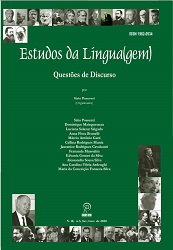Medium and ethical worlds: notes on the construction of the Observatório da Literatura Digital Brasileira
DOI:
https://doi.org/10.22481/el.v18i3.7943Keywords:
Hypergender; Digital literature; Medium; Ethical worldsAbstract
In this article, we articulate what Régis Debray defines as medium to a notion proposed by Maingueneau in his studies of the discursive ethos: ethical worlds. It is a matter of detailing what can be understood by values, beliefs and imaginary, terms as necessary as opaque when they appear to describe the effects of meaning that operate in the so called order of the sensitiveness. The hypothesis is that technical issues are at the heart of this operation and that, if we consider the inscriptions of the speeches in tangible materialities, we can better explain the distribution of the discourses in a given social organization and the institutional functions that authorize it. To this end, the concept of hypergender will be mobilized in order to present a case: the project that creates the Observatório da Literatura Digital Brasileira is the trigger for the reflection on “digital literature”, a rubric under construction.
Downloads
References
BOURDIEU, P. Uma revolução conservadora na edição. Tradução Luciana Salazar Salgado e José Muniz Jr. In: Política & Sociedade, Florianópolis, vol. 17, n. 39, p. 198-249, 2018.
CASTELLS, M. A galáxia da internet: reflexões sobre a internet, os negócios e a sociedade. Tradução Maria Luiza Borges; revisão Paulo Vaz. Rio de Janeiro: Zahar, 2003.
CLARES, L. M. Mediação editorial na comunicação científica: um estudo de dois periódicos de humanidades. 2017. 147 fl. Dissertação (Mestrado em Linguística). Programa de Pós-graduação em Linguística, Universidade Federal de São Carlos, São Carlos, 2017.
DEBRAY, R. Transmitir: o segredo e a força das ideias. Tradução Guilherme João de Freitas Teixeira. Petrópolis: Vozes, 2000.
DEBRAY, R. Curso de midiologia geral. Tradução Guilherme João de Freitas Teixeira. Petrópolis, RJ: Vozes,1990.
DI FANTI, M. G. C.; FERÉ, L. Ethos discursivo [dossiê]. Letras Hoje, Porto Alegre, vol. 53, n. 3, jul-set. 2018.
EVEN-ZOHAR, I. Teoria dos polissistemas. Tradução Luís Fernando Marozo, Carlos Rizzon, Yanna K. Cunha. In: Revista Translatio, Porto Alegre, n. 18, p.1-21, 2018.
LANIER, J. Bem-vindo ao futuro. Uma visão humanista sobre o avanço da tecnologia. Tradução Cristina Yamagami. São Paulo: Saraiva, 2012.
MAINGUENEAU, D. Novas tendências em Análise do Discurso. Tradução Freda Indursky. 3 ed. Campinas: Pontes, 1997.
MAINGUENEAU, D. Gênese dos discursos. Tradução Sírio Possenti. Curitiba: Criar, 2005.
MAINGUENEAU, D. Discurso literário. Tradução Adail Sobral. São Paulo: Contexto, 2006.
MAINGUENEAU, D. A propósito do ethos. In: MOTTA, A. R.; SALGADO, L. (orgs.) Ethos discursivo. Tradução Luciana Salgado. São Paulo: Contexto, 2008.
MAINGUENEAU, D. Discurso e Análise do Discurso. Tradução Sírio Possenti. São Paulo: Parábola, 2015.
MOTTA, A. R.; SALGADO, L. S.; POSSENTI, S. Ethos discursivo em diversas dimensões [dossiê]. Cadernos de Estudos Linguísticos, Campinas, vol. 61, p. 1-4, 2019.
ROCHA, R. C. Literatura digital. In: CABRAL, Cleber Araújo; RIBEIRO, Ana Elisa (orgs.). Tarefas da Edição: mediapédia. Belo Horizonte: Impressões de Minas, 2020.
ROCHA, R. C. Além do livro: literatura e novas mídias. In: Estudos de Literatura Brasileira Contemporânea, Brasília, n. 47, p. 11-17, 2016.
SALGADO, L. S.; DELEGE, M. Mundo ético e mídium: uma cenografia paulistana para a ciência brasileira. Letras Hoje, Porto Alegre, vol. 53, n. 3, p. 374-385, 2018.
SALGADO, L. S.; OLIVA, J. T. A produção de uma intimidade ubíqua, esteio da fratura social. In: Discurso & Sociedad, Barcelona, vol.13, n. 3, p. 432-448, 2019.
SILVEIRA, S. A. da. Democracia e os códigos invisíveis: como os algoritmos estão modulando comportamentos e escolhas políticas. São Paulo: Sesc, 2019.
Downloads
Published
How to Cite
Issue
Section
License
Copyright (c) 2020 Language Studies

This work is licensed under a Creative Commons Attribution 4.0 International License.

Estudos da Língua(gem) is licensed under a Creative Commons Attribution 4.0 International License.
Authors who publish in the journal Estudos da Língua (gem) agree with the following terms:
The journal Estudos de Língua(gem) maintains the copyrights of the contributions published. These rights include the publication of the contribution and make its content available for free through the portal.







